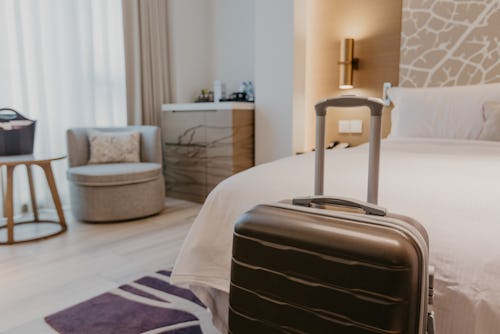Health
What You Need To Know Before Staying In A Hotel During The Coronavirus Pandemic
"On the spectrum of activities, staying in a hotel is a moderate-risk activity."

States across the U.S. are reopening in some shape or form after initially mandating lockdowns in March due to the coronavirus pandemic. If you've made travel plans, you're probably wondering how you can remain safe along the way. You can do this by first learning how to protect yourself when you get a hotel room.
"On the spectrum of activities, staying in a hotel is a moderate-risk activity," Dr. Nate Favini, MD, Medical Lead of Forward, the preventive primary care practice, tells Bustle. "It’s certainly higher risk than staying home, but it’s lower risk than attending a large indoor gathering of people." He explains that due to the amount of people you can come into contact with — checking in at the lobby, having your bags carried to your room, housekeeping, and room service — it's possible to be exposed to the virus. "Even being in a space that other people have recently occupied can expose you to their aerosols and respiratory droplets," Dr. Favini says.
What To Do Before You Book A Hotel
The safest way to begin your trip is to call ahead and see what protocols the hotel has in place to protect guests and staff from COVID-19, Favini says. Dr Frank Ong. MD, CPI, CCRP and Chief Medical and Scientific Officer at Everlywell, an at-home lab testing company, tells Bustle, "At minimum, the hotel should be thoroughly disinfecting rooms between stays and providing regular diagnostic testing for their employees." He suggests checking to see if their dining rooms and common areas are practicing social distancing as well. "If a hotel doesn't have these safety measures in place, think twice about staying there," Dr. Ong says.
How To Disinfect Your Hotel Room
Once you've planned ahead and gotten information on the hotel, it's time to sanitize your room on your own for added protection.
"To stay as safe as possible, try to avoid entering your room until a few hours after it’s been cleaned and the last occupant has left," Dr. Favini says. He recommends bringing sanitizing solution or wipes into the room and cleaning all the hard surfaces before taking off your mask. Opening your window can help ventilate the space while you do this. And to further reduce the risk of exposure, Dr. Favini suggests opting out of housekeeping to minimize the number of people who come in and out of your room.
It's also a good idea to avoid any commonly used items in the room like drinking glasses, ice buckets, remote controls, or hotel phones — unless you personally disinfect these items or see them disinfected, Dr. Ong suggests. He also recommends bringing extra clothes or blankets of your own in case you get cold at night. "Try not to use the hotel comforter unless the hotel specifically states that their comforters, blankets and duvets are being washed between stays," he says.
"The riskiest part of staying in a hotel room may actually be what happens outside of the room itself," Dr. Ong says. "If you must travel, avoid common areas like hotel dining rooms, restaurants, gyms, hot tubs, Jacuzzis, saunas, and pools, unless social distancing protocols are being followed." He explains that areas like these often compound risks, because face coverings are difficult to wear while enjoying the water. Though, he does admit that the chlorine in most pools should help sterilize viruses and bacteria. "So if you see an empty pool, it's probably safe to enjoy," he says.
Staying In An AirBnB Might Be A Safer Option
While there are ways to ensure your hotel stay is a little safer, Dr. Favini suggests booking an entire AirBnB home instead. "You can control when to enter a location after the previous person has vacated it," he says. "You can also control who enters your home. For example, there’s no lobby where you will be in close proximity to other people, and some Airbnbs allow you to check in without seeing the other person."
No matter what you decide to do, the most important thing is your safety. Taking the time to make phone calls, sanitize your room, and socially distance from others may seem like an extra hassle, but it's worth knowing you're helping yourself stay a little safer.